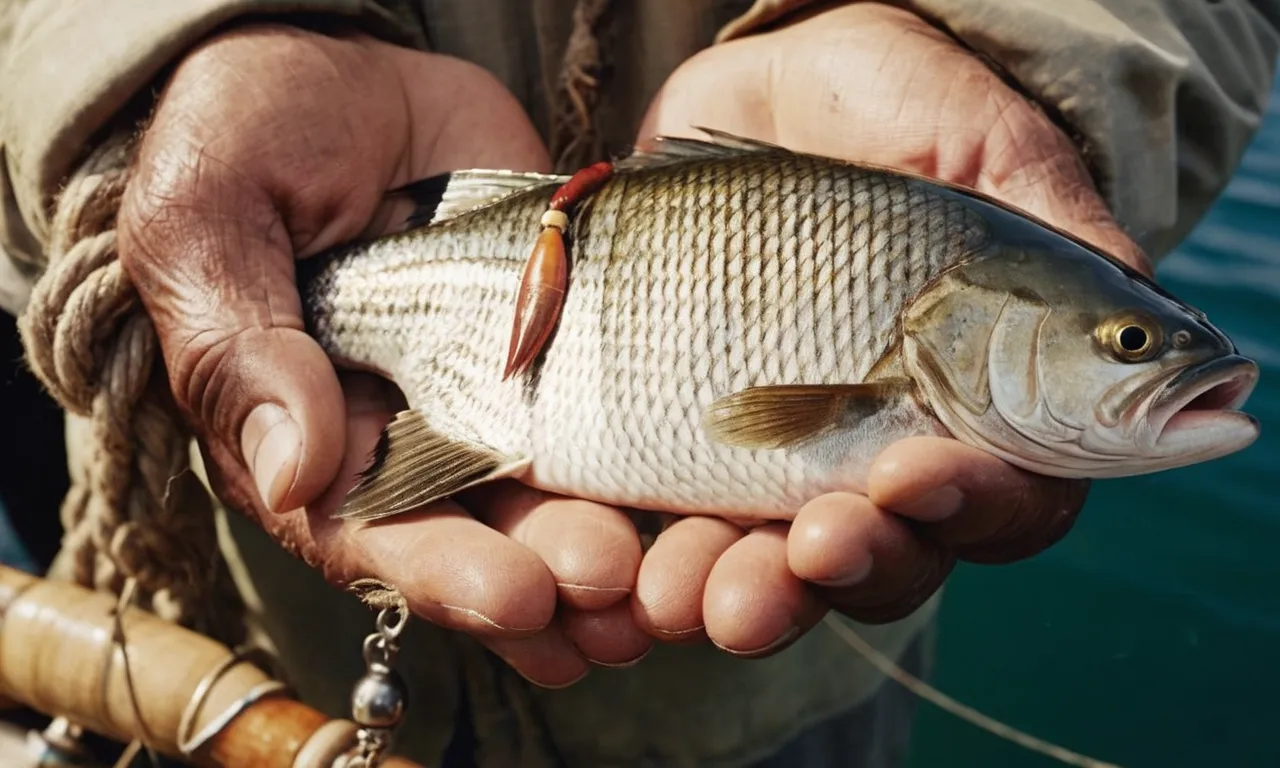What Does Fish Mean In The Bible? A Comprehensive Look
The fish is one of the most prolific symbols found in the Bible. If you’ve ever wondered what fish means from a biblical perspective, you’re not alone. Fish and fishing references are found throughout the Old and New Testaments, carrying rich symbolism about humanity, the natural world, and the divine.
In short, fish and fishing in the Bible represent abundance, fertility, provision, the spreading of the Gospel, and mankind’s relationship with God. But there’s much more to this symbol than meets the eye.
In this comprehensive guide, we will explore the meaning of fish in the following sections:
Fish as a Symbol of Fertility and Abundance
The Miraculous Catch of Fish
One of the most well-known stories involving fish in the Bible is the miraculous catching of fish by Jesus’ disciples in Luke 5:1-11. Jesus told the disciples to let down their nets in the Sea of Galilee after they had caught nothing all night.
Their nets became so full of fish that the boats began to sink! This incredible number of fish symbolized the great abundance and fertility that being followers of Jesus would bring the disciples.
The huge catch also represented the vast number of people that would come to follow Jesus. Just as the fish filled two boats to overflowing, Jesus would gain followers beyond number. This story reminds believers today that following God’s guidance leads to fruitfulness and influence far beyond human means.
The Multiplication of Fish and Loaves
A similar idea of divine blessing and abundance through fish in the Bible is seen in the feeding of the 5,000 with five loaves and two fish in John 6:1-14. Though the starting portion of available food seemed extremely small for the huge crowd, Jesus miraculously multiplied the fish and bread.
After everyone ate, there were twelve baskets of leftovers gathered up.
This sign pointed to Jesus as the ONE who provides nourishment just as God had provided manna abundantly for the Israelites in the wilderness. The surplus leftover also indicated the lavish generosity of the Creator who delights in supplying every need of His children abundantly.
The Promised Land Flowing with Milk and Honey
A key passage involving an image of provision and fertility in the Old Testament is the description of Canaan as “a land flowing with milk and honey” (Exodus 33:3). The abundance of honey as well as fish from sources like the Sea of Galilee made it an exceptionally lush and productive destination for the Hebrew wandering in the desert.
Just as God cared for the livestock and fish supply in preparing Canaan, He demonstrates loving concern for all the needs of His people. Even in difficult seasons of life, believers can trust His promises to lead them into seasons of refreshment and vitality in His perfect timing.
Fish as a Symbol of Christianity and Evangelism
Jesus’ Disciples as ‘Fishers of Men’
In the Gospels, Jesus often used fishing and fish as metaphors when speaking to his disciples. He told Simon Peter and Andrew that he would make them “fishers of men” (Matthew 4:19). This metaphor symbolized bringing people into the Kingdom of God, like catching fish in a net.
Just as fish are caught and pulled from the waters, Jesus wanted his disciples to catch people and pull them into God’s Kingdom through evangelism.
The Ichthys Fish Symbol
One of the most ubiquitous symbols of Christianity today is the Ichthys fish. The word Ichthys is Greek for fish. Early Christians used the fish symbol to identify each other and mark meeting places during persecution in the Roman Empire.
The Ichthys is formed with two curved lines depicting a fish, with the Greek letters ΙΧΘΥΣ (Ichthys) inside – which is an acronym for “Jesus Christ, God’s Son, Savior.”
The fish symbol remains widely popular today, displayed on cars, clothing, jewelry, and in churches. It continues to serve as a concise visual symbol representing core Christian beliefs – Jesus as Son of God and humanity’s savior.
Some Christians also see an allusion to “fishing for people” in the fish symbol, calling to mind Christ commissioning his followers to reach others with the Gospel message.
Fishing for People
From Jesus’ calling of the first disciples to be “fishers of men,” fishing has been used metaphorically to represent evangelism and making converts throughout Christian history. Authors like Thomas More and John Bunyan used the metaphor, and 19th century hymn writer Sarah Doudney notably penned the lyrics:
| Give me a faithful heart, Likeness to thee, That each departing day Henceforth may see Some work of love begun, Some deed of kindness done, Some wanderer sought and won, Something for thee. |
In modern times, ministries continue using fishing language in their names and publications, like Fishing for Souls and Fishers of Men radio programs. The connection remains relevant – as fish are harvested from the waters, Christians strive to pull people into faith through spreading the Gospel worldwide.
Fish in the Story of Jonah
Jonah Swallowed by the Great Fish
The story of Jonah is a symbolic narrative about the prophet Jonah recorded in the Book of Jonah in the Hebrew Bible. Jonah was commanded by God to go to the city of Nineveh to prophesy against it “for their great wickedness is come up before me,” but Jonah instead attempted to flee by taking a ship to Tarshish (Jonah 1:2-3).
To stop him, God sent a great storm that threatened to break up the ship. Jonah told the sailors about his disobedience and said if they threw him overboard, the storm would cease. The sailors were reluctant but eventually did throw Jonah into the raging sea (Jonah 1:4-16).
At that point, the storm calmed, but God had prepared a great fish to swallow up Jonah.
The type of marine animal is not identified in the Book of Jonah, but it is typically imagined as a whale. Jonah remained inside the belly of the great fish for three days and three nights before the fish vomited him up onto dry land (Jonah 1:17).
This miraculous delivery prefigures Jesus’s death and three days in the earth before his resurrection (Matthew 12:38-41).
Jonah as a Sign and Symbol
There has been much speculation on whether it is possible for a whale or large fish to actually swallow a human whole and alive. According to whale experts, even the largest whales have throats too small to swallow an adult, so Jonah’s story is likely symbolic.
However, there have been very rare cases of sailors reported being swallowed by whales throughout history. For example, in 1891, whaling ship Star of the East crew members reported that a sperm whale had swallowed one of their shipmates.
Whether taken literally or symbolically, the key element is that Jonah’s being swallowed by a great fish and spit up again prefigures Jesus Christ’s death for three days and resurrection. As Jesus himself said, “For as Jonah was three days and three nights in the belly of a huge fish, so the Son of Man will be three days and three nights in the heart of the earth” (Matthew 12:40).
Jonah’s deliverance is thus seen as a typological metaphor for salvation through Jesus.
The Fish Gate and Fish Pool of Jerusalem
The Fish Gate in Nehemiah
The Fish Gate was an entrance into the walls of Jerusalem first mentioned in the Bible during Nehemiah’s rebuilding of the walls. Nehemiah describes repairing the Fish Gate with the sons of Hassenaah (Nehemiah 3:3). The gate likely obtained its name from a fish market in the area.
Merchants would have brought fish caught in the Mediterranean Sea and Sea of Galilee through the gate to sell in the city.
The exact location of the Fish Gate is unknown, but it may have been on the northern wall, possibly near the Gennath Gate. The name has survived over centuries as there is still a “Gate of the Fish Market” or “Fish Gate” in the northern wall of Jerusalem’s Old City today.
However, whether today’s Fish Gate is the same location as the biblical Fish Gate is uncertain.
The Pool of Bethesda
The Pool of Bethesda was a pool in Jerusalem known for its healing capabilities. It was located near the Sheep Gate mentioned in John 5:2. In 1888, archaeologists discovered the remains of a large pool with five porches buried near the modern Saint Anne’s Church, reinforcing the biblical account.
According to John’s Gospel, crowds of sick people would gather at the Pool of Bethesda, believing that an angel would occasionally descend and stir the waters. It was believed that the first person to enter the pool after the stirring would be healed.
This is where Jesus healed the invalid man waiting for someone to help him into the pool (John 5:1-15).
It is fascinating that archaeology has uncovered a pool corresponding to John’s detailed description. The Pool of Bethesda reminds us of not only Jesus’ miraculous healing power but also his compassion for the suffering.
Fish and Fishing Laws in the Bible
Kosher Dietary Restrictions
In the Old Testament, God provided the Israelites with specific instructions on which types of fish were permissible to eat. According to Leviticus 11:9-12, fish with fins and scales were considered “clean” and acceptable to eat. This included fish like tuna, salmon, trout, herring, and others.
Shellfish such as lobster, shrimp, crab, and oysters were prohibited as they did not meet the fins and scales requirement. These dietary rules helped the Israelites honor God by obeying his commands about holiness and avoiding ceremonial uncleanness.
The kosher fish laws served both spiritual and practical purposes. Abstaining from certain fish helped the Israelites avoid pagan rituals and set them apart as God’s people. It also had health benefits, as bottom-dwelling fish were more likely to feed on waste and pose a risk of transmitting diseases or parasites if eaten.
The specific guidelines on acceptable fish protected the Israelites and reminded them of their special relationship with God.
Sunday Fishing Restrictions
While the Bible does not prohibit fishing on Sundays, Christian tradition eventually led to restrictions on Sunday fishing activities. During the early church, Sundays were set aside as a day of rest and worship in honor of Christ’s resurrection.
By the 5th century AD, the Catholic church began implementing strict bans on work-related activities on Sundays, including agricultural work and fishing.
These Sunday prohibitions on fishing continued into the modern era in many Christian nations. For instance, in Great Britain and Ireland, restrictions on commercial Sunday fishing were encoded into law for centuries, though recreational fishing was still permitted.
While strict Sunday bans have relaxed over time, some limitations remain in various regions. These practices reflect Christianity’s historic efforts to preserve Sunday as a holy day reserved for spiritual reflection and celebration.
Regardless of specific fishing prohibitions, the Bible upholds the Sabbath principle of resting one day out of seven. Setting aside Sundays provided spiritual, physical, and community benefits for generations of Christians.
While Sunday fishing laws are less common today, honoring the Lord’s Day remains an important biblical principle for believers.
Conclusion
As we have seen, fish and fishing carry deep symbolic meaning in the Bible. They represent abundance and fertility, provision from God, the spreading of the Gospel, and humanity’s dependence on the divine. Specific stories involving fish point to theological truths about Christianity and Judaism.
So next time you encounter a fish reference in the Scriptures, consider what richer meaning might lie beneath the surface. The humble fish turns out to be a profound spiritual symbol with much to teach us.







